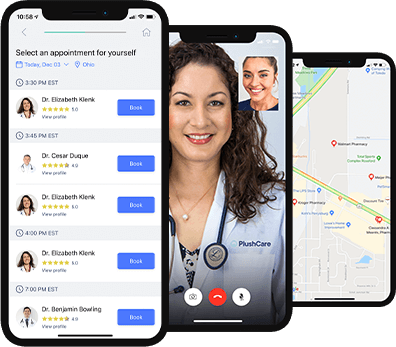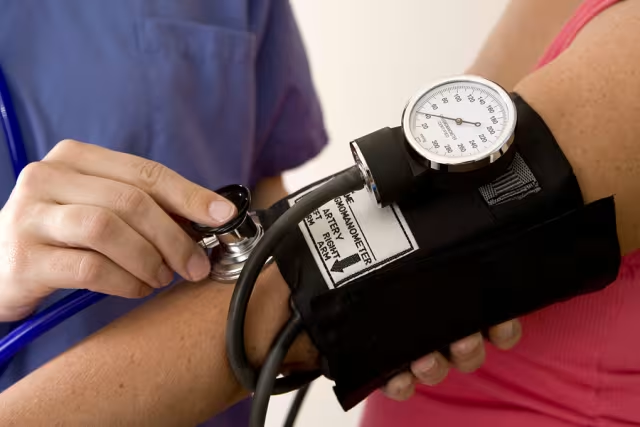How Do You Feel When You Have High Blood Pressure?
High blood pressure is hard to catch because it often presents no symptoms. Even symptoms which may be a result of high blood pressure are hard to identify as directly linked to the condition, such as headaches or shortness of breath.
According to the CDC, "Tens of millions of adults in the United States have high blood pressure, and many do not have it under control." Here, we will be going over some of the key ways you can spot symptoms of hypertension.

1
Book on our free mobile app or website.
Our doctors operate in all 50 states and same day appointments are available every 15 minutes.
2
See a doctor, get treatment and a prescription at your local pharmacy.
3
Use your health insurance just like you normally would to see your doctor.
What is Hypertension?
Hypertension, or high blood pressure, is the most common cardiovascular disease in the US. Hypertension occurs when the pressure your blood puts on your artery walls is higher than normal ranges for a sustained period of time.
A number of health conditions, illnesses, and medications that narrow the arteries increase your high blood pressure. This is also why high blood pressure is so much more common with older adults. As we age, our arteries narrow or become more rigid, making the same amount of pressure in a regular sized artery equivalent to high blood pressure in a narrowed artery.
There are two types of hypertension:
Essential hypertension is when the underlying cause of the high blood pressure is unknown, which may be as many as 95% of cases in the US.
Secondary hypertension is when the direct cause of the high blood pressure can be determined. Common causes include kidney disease, tumors, and birth control pills and pregnancy in women.
Developing either type of hypertension depends on your medical history, demographics, genetics, and personal habits.
Hypertension Risk Factors
High blood pressure is more common in certain demographic groups:
African-Americans
Lower-income households
Residents of the southeastern US
Individuals older than 55
Certain traits also increase your likelihood or could even cause high blood pressure:
Overweight: Being more than 15% of the healthy weight for your body mass increases your likelihood of getting high blood pressure significantly. Obese people are two to six times more likely to develop high blood pressure than healthy weight individuals.
Heavy alcohol drinkers: Those who drink more than two drinks a day have higher rates of high blood pressure.
Inactive: Being inactive contributes to obesity and high blood pressure.
Smokers: Smoking negatively affects key body functions, including your ability to exercise, therefore contributing to obesity and high blood pressure.
Additionally, a diet heavy in salt, regular use of decongestants, medications like pain relievers and birth control pills, as well as illegal drugs such as cocaine, all increase your chance of having high blood pressure.
Read: Top Tips For a Healthy Heart
What Are Symptoms of High Blood Pressure?
High blood pressure can be present for years without symptoms, all the while causing damage to your heart and blood vessels. In fact, most people have no symptoms; that is why it is called the “silent killer”.
For those who do show signs or have severe enough hypertension or hypertensive crisis, high blood pressure symptoms may include:
Shortness of breath
Nosebleeds
Headaches
Confusion or fatigue
Chest pain
Vision problems
Pounding in your ears, neck, or chest
Plenty of additional symptoms of high blood pressure can be caused by another illness or condition, making high blood pressure not the root cause of illness or discomfort. These include:
Facial flushing: Facial flushing happens when facial blood vessels dilate causing blushing and feeling warm. There are numerous causes of facial flushing such as weather, spicy foods, or stress, but it is not caused by high blood pressure.
Hot flashes: Some individuals worry that hot flashes in men and high blood pressure are correlated. However, they can be caused by prescription medication, being overweight, medications, thyroid illnesses, and sudden hormone changes.
Blood spots in eyes: Medically known as subconjunctival hemorrhage, may happen after a strong cough or sneeze or rubbing your eye. Besides these an underlying condition may be present like diabetes, hypertension, blood-thinning medication or blood clotting disorders. If you have recurrent blood spots in your eyes or other types of bleeding, talk to your doctor.

1
Book on our free mobile app or website.
Our doctors operate in all 50 states and same day appointments are available every 15 minutes.
2
See a doctor, get treatment and a prescription at your local pharmacy.
3
Use your health insurance just like you normally would to see your doctor.
A Note About Malignant Hypertension
Malignant hypertension is the sudden development of extremely high blood pressure and should be treated as a hypertensive crisis or medical emergency. Malignant hypertension occurs when a person's blood pressure jumps to 180/120 or higher.
This can be caused by untreated high blood pressure, missing high blood pressure medication, kidney disease, tumors, spinal cord injuries, or illegal drugs. It is very rare, and only 1% of individuals develop this condition, but it is life threatening. The main symptoms are:
Blood pressure is 180/120 mmHg or higher
Sudden increase in high blood pressure
Signs of organ damage, especially the kidneys, heart or eyes
Severe headache with blurred vision and confusion
Difficulty breathing
Severe chest pain
Unresponsiveness
Numbness in extremities
Seizures
In rare cases, malignant hypertension can also lead to brain swelling, a very dangerous condition called hypertensive encephalopathy. Symptoms include confusion, restlessness, headaches, vomiting, seizures, seizures and even a coma. If you have any of these symptoms or suspect you are having a hypertensive crisis, you should call 911 and seek medical care immediately.
Read more: Stages of Hypertension: The Four Stages, Symptoms, Treatment & More
Side Effects of High Blood Pressure
Hypertension, or high blood pressure, is often called the “silent killer" because it may have no signs or symptoms. Untreated high blood pressure can cause a number of diseases and is life threatening. The most common severe complications of untreated hypertension are:
Atherosclerosis: One of the most serious conditions that is caused by untreated hypertension is a build-up of plaque in the arteries. Such plaque build up may block or prevent normal blood flow and limit proper blood circulation through the extremities or organs like the heart. Patients with atherosclerosis feel chest pain when doing physical activity or experience stress, and they are much more likely to have a heart attack or stroke.
Heart disease: The number one cause of death from high blood pressure is hypertensive heart disease. This includes a group of conditions like heart failure, heart attack, and left ventricular hypertrophy. This results from high blood pressure thickening the heart muscles, and then those muscles becoming less effective. Symptoms for all of these diseases are shortness of breath, chest pain, swelling at the ankles, irregular pulse, nausea, and fatigue.
Stroke: A stroke is four to six times more likely for individuals with high blood pressure. A stroke happens when blood flow to parts of the brain are cut off, causing brain cells to be deprived of glucose and oxygen, resulting in permanent brain damage. Signs of a stroke are very sudden, such as numbness in one side of the body, dizziness, blurred vision, or confusion. If you experience these symptoms, call 911 immediately.
Kidney disease: High blood pressure can damage blood vessels and filters that lead to the kidney. In earlier stages, this causes kidney disease or renal disease, and in later stages it can cause total kidney failure, in which dialysis or kidney transplants are necessary. Symptoms include a decrease in urine and fluid retention.
Eye disease: Along with the problems listed above, hypertension can cause eye disease by damaging the retina blood vessels. Called hypertensive retinopathy, the damage to your vision can be very serious.
When to Contact a Doctor
If you have any of the symptoms described above, you should talk to a doctor. In general, if you have any of the major risk factors, you should be tested for high blood pressure regularly.
Additionally, you should call 911 immediately if you have any of the following symptoms, as they can be a sign of untreated high blood pressure resulting in a hypertensive emergency:
Blood pressure 180/120 or higher with
Blurred vision or headache
Numbness on one side of the body
Nausea and vomiting
Increasing shortness of breath, chest pain, or confusion
Severe anxiety
Seizure
Can I Get a Blood Pressure Prescription Online?
Yes! In order to get any prescription medication, you’ll have to consult a doctor. Fortunately, online providers like PlushCare make getting a virtual appointment, simple, affordable, and convenient.
High blood pressure is one of the many things our telemedicine services are designed to help treat. Although we cannot take blood pressure measurements virtually, we can help interpret your results and get you set up on the right treatment plan.
If you go to a pharmacy or take a blood pressure measurement at home and are worried about hypertension, contact a PlushCare doctor today.
Managing hypertension can take months or even years. Save the time and energy of having to go in for appointments with your physician and book an appointment to see a doctor online in just minutes. PlushCare accepts all major insurance providers and is proud to offer service from some of the best primary care physicians in the country.
Read More About High Blood Pressure
Sources:
PlushCare is dedicated to providing you with accurate and trustworthy health information.
American Heart Association. Essential hypertension. Accessed on April 06, 2021 at https://www.ahajournals.org/doi/full/10.1161/01.CIR.101.3.329
American Heart Association. Hypertensive Crisis: When You Should Call 911 for High Blood Pressure Accessed on April 07, 2021 at
Centers for Disease Control and Prevention. High Blood Pressure. Accessed on December 30, 2020 at https://www.cdc.gov/bloodpressure/index.htm
Mayo Clinic. High blood pressure (hypertension). Accessed on December 30, 2020 at https://www.mayoclinic.org/diseases-conditions/high-blood-pressure/symptoms-causes/syc-20373410
U.S. National Library of Medicine. MedlinePlus. High Blood Pressure. Accessed on December 30, 2020 at https://medlineplus.gov/highbloodpressure.html


